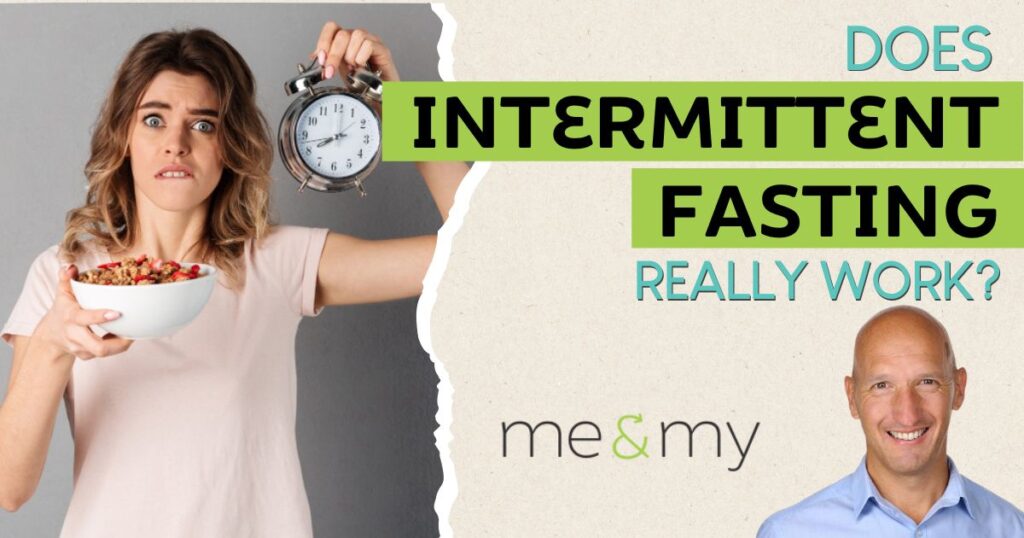Unveiling the Truth: Does Intermittent Fasting Really Work?

Intermittent fasting (IF) has exploded onto the health and wellness scene, hailed as a miracle cure for everything from weight loss and improved blood sugar control to enhanced brain function and even longevity.
But with countless articles, conflicting information, and even a touch of celebrity buzz swirling around, it’s easy to feel overwhelmed and unsure about what to believe. Inspired by insights from the me&my health up podcast episode hosted by Anthony Hartcher.
So, let’s peel back the layers and uncover the real truths about intermittent fasting: does it truly live up to the hype?
Watch the full video podcast here:
First things first: Demystifying the fasting phenomenon
Unlike traditional calorie-restrictive diets that often leave you feeling deprived, IF focuses on a different approach – cycling between periods of eating and fasting. This means instead of counting calories throughout the day, you dedicate specific windows for nourishment and allow your body to enter a fasted state during the remaining hours.
Popular methods include:
- 16:8: Fast for 16 hours, often overnight while you sleep, and restrict your eating to an 8-hour window during the day.
- 5:2: Eat normally for 5 days and significantly restrict your calorie intake (500-800) on 2 non-consecutive days.
- Eat Stop Eat: Fast for 24 hours once or twice a week.
Weight loss: The million-dollar question

Let’s address the elephant in the room – can IF help you shed those unwanted pounds? The good news is, yes, IF can be an effective tool for weight loss. Studies have shown it can lead to moderate weight loss, similar to what you might achieve with traditional calorie-restricted diets.
But here’s the crucial caveat: it’s not a magic bullet. You still need to be mindful of your overall calorie intake and make healthy food choices within your eating window.
Think quality over quantity – ditch the processed junk and prioritize whole, unprocessed foods, fruits, vegetables, and lean protein sources. Remember, even during your eating window, overindulging can negate the benefits of fasting.
Exploring the potential health benefits of IF

While weight loss often takes center stage, IF might offer a wider spectrum of potential health benefits that go beyond the numbers on the scale:
- Improved blood sugar control: Studies suggest IF can improve insulin sensitivity and reduce blood sugar levels, potentially offering significant advantages for individuals with type 2 diabetes or prediabetes.
- Reduced inflammation: Chronic inflammation is linked to various diseases, and some research indicates IF may have anti-inflammatory properties, potentially reducing the risk of chronic conditions.
- Enhanced brain health: Emerging research suggests IF might improve cognitive function, memory, and even protect against neurodegenerative diseases like Alzheimer’s and Parkinson’s.
- Increased longevity: While promising, animal studies hint at a potential lifespan extension with IF, but more robust human research is needed to confirm these findings.
But wait, there’s more… important considerations before you embark on your IF journey
Before you jump on the IF bandwagon and dive headfirst into a fasted state, consider these crucial points:
- It’s not a one-size-fits-all approach: Individuals with certain health conditions, pregnant or breastfeeding women, and those with a history of eating disorders should consult a healthcare professional before trying IF. It’s crucial to ensure it’s safe and suitable for your individual needs.
- Listen to your body: Don’t push yourself too hard, especially when starting. If you experience intense hunger, dizziness, or other unpleasant symptoms, adjust your approach or stop altogether. Your body is your best guide – pay attention to its signals.
- Sustainability is key: The most effective approach is one you can stick with long-term. Choose a method that fits seamlessly into your lifestyle and preferences. Don’t force yourself into a restrictive plan that feels unsustainable – find a rhythm that works for you.
- Focus on quality, not just quantity: What you eat during your eating window matters just as much as when you eat. Prioritize whole, unprocessed foods, fruits, vegetables, and lean protein sources to nourish your body with the nutrients it needs to thrive. Remember, even during your eating window, mindful choices are key.
Remember, IF is a tool, not a quick fix. While it can be a valuable addition to your health journey, it’s just one piece of the puzzle. Combine IF with other healthy lifestyle practices like regular exercise, quality sleep, stress management, and a focus on overall well-being for optimal results.
Optimizing your IF journey for success
The podcast episode highlighted the importance of managing your emotions alongside IF for a truly successful experience. Here are some key takeaways to remember:
Unrealistic expectations

Having unrealistic expectations about yourself, others, or the world can set you up for disappointment and emotional stress, potentially derailing your IF efforts. Practice self-compassion, understand that setbacks are part of the journey, and focus on progress, not perfection.
Celebrate your wins, big and small, and view challenges as opportunities for growth.
Mindful eating

During your eating window, be present and mindful of your choices. Savor your food, eat slowly, and stop when you’re comfortably full. Avoid emotional eating and mindless snacking triggered by stress, boredom, or other external cues.
Tune into your body’s hunger and satiety signals for a more balanced and enjoyable eating experience.
Sunlight exposure

Support your circadian rhythm by getting early morning sunlight exposure. This helps regulate hormones and sleep-wake cycles, potentially improving your IF experience by promoting better sleep quality and reducing cravings during fasted periods.
The verdict: Does Intermittent Fasting work?

For many, IF can be a valuable tool for weight management and potentially offer additional health benefits. However, it’s crucial to remember that it’s not a one-size-fits-all solution. Consider your individual needs, preferences, and health status before diving in.
Consult a healthcare professional if you have any underlying health conditions or concerns. Remember, a sustainable, holistic approach that prioritizes overall well-being is key to achieving your health goals.
Beyond the hype: Embracing a balanced approach to IF
Ultimately, IF is not a fad diet or a magic bullet for health. It’s a dietary approach that, when implemented thoughtfully and sustainably, can support your health journey. If you’re curious about exploring IF, remember:
- Start slow: Begin with shorter fasting periods and gradually increase the duration as your body adjusts.
- Listen to your body: Pay attention to hunger cues and adjust your approach as needed. Don’t be afraid to modify or stop if it doesn’t feel right for you.
- Focus on quality over quantity: Prioritize nutrient-rich, whole foods during your eating window to nourish your body and support your overall health.
- Seek support: Consider consulting a registered dietitian or nutritionist or healthcare professional for personalized guidance and support on your IF journey.
Remember, the most sustainable approach is the one that fits seamlessly into your lifestyle and supports your overall well-being. Don’t be afraid to experiment, find what works for you, and celebrate your progress along the way!
Navigating your IF Journey with Holistic Support
The world of intermittent fasting can be exciting yet overwhelming. While this blog equips you with knowledge, consider partnering with a holistic health coach for personalized guidance.
At me&my wellness, we tailor our approach to your unique needs and goals, whether it’s weight management, optimizing your IF experience, or achieving overall well-being. We go beyond just diet, incorporating mindfulness, stress management, and lifestyle adjustments for a sustainable and holistic approach to health.
Ready to unlock your full potential? Book a 15-minute FREE consultation with us today and embark on your personalized wellness journey!

